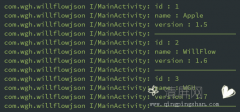因为gson网上的帮助文档打开时比较慢,所以把帮助文档摘录如此,方便查看:
1. 基本类型转化
Java代码
public static void main(String[] args) {
Gson gson = new Gson();
System.out.println(gson.toJson(1)); // ==> prints 1
System.out.println(gson.toJson("abcd"));// ==> prints "abcd"
System.out.println(gson.toJson(new Long(10)));// ==> prints 10
int[] values = { 1 };
System.out.println(gson.toJson(values));// ==> prints [1]
System.out.println("============");
int one = gson.fromJson("1", int.class);
Integer one1 = gson.fromJson("1", Integer.class);
Long one2 = gson.fromJson("1", Long.class);
String str = gson.fromJson("\"abc\"", String.class);
String anotherStr = gson.fromJson("[\"abc\"]", String.class);
int[] ints = gson.fromJson("[1,2,3,4,5]", int[].class);
Boolean b = gson.fromJson("false", Boolean.class);
System.out.println(b == false); //==> prints true
}
2.对象转化
Java代码
public class BagOfPrimitives {
private int value1 = 1;
private String value2 = "abc";
//是用于声明变量在序列化的时候不被存储
private transient int value3 = 3;
BagOfPrimitives() {
// no-args constructor
}
public static void main(String[] args) {
BagOfPrimitives obj = new BagOfPrimitives();
Gson gson = new Gson();
String json = gson.toJson(obj);
System.out.println(json); //==> json is {"value1":1,"value2":"abc"}
BagOfPrimitives obj2 = gson.fromJson(json, BagOfPrimitives.class);
System.out.println(obj2.value1);
System.out.println(obj2.value2);
System.out.println(obj2.value3);//==>3
String json1 = "{'value1':1,'value2':'abc','value3':4}";
BagOfPrimitives obj3 = gson.fromJson(json1, BagOfPrimitives.class);
System.out.println(obj3.value1);
System.out.println(obj3.value2);
System.out.println(obj3.value3); //==>3
}
}
Note that you can not serialize objects with circular references since that will result in infinite recursion.
如果要是用json lib的话,上面的代码可以写成如下所示:
Java代码
String json1 = "{'value1':1,'value2':'abc','value3':4}";
JSONObject jsonObj = JSONObject.fromObject( json1 );
BagOfPrimitives obj3 = (BagOfPrimitives) JSONObject.toBean( jsonObj, BagOfPrimitives.class );
Finer Points with Objects
It is perfectly fine (and recommended) to use private fields
There is no need to use any annotations to indicate a field is to be included for serialization and deserialization. All fields in the current class (and from all super classes) are included by default.
If a field is marked transient, (by default) it is ignored and not included in the JSON serialization or deserialization.
This implementation handles nulls correctly
While serialization, a null field is skipped from the output
While deserialization, a missing entry in JSON results in setting the corresponding field in the object to null
If a field is synthetic , it is ignored and not included in JSON serialization or deserialization
Fields corresponding to the outer classes in inner classes, anonymous classes, and local classes are ignored and not included in serialization or deserialization
Nested Classes (including Inner Classes)
Gson can serialize static nested classes quite easily.
Gson can also deserialize static nested classes. However, Gson can not automatically deserialize the pure inner classes since their no-args constructor also need a reference to the containing Object which is not available at the time of deserialization. You can address this problem by either making the inner class static or by providing a custom InstanceCreator for it. Here is an example:
Java代码
public class A {
public String a;
class B {
public String b;
public B() {
// No args constructor for B
}
}
}
NOTE : The above class B can not (by default) be serialized with Gson.
 相关文章
相关文章

 精彩导读
精彩导读 热门资讯
热门资讯 关注我们
关注我们
